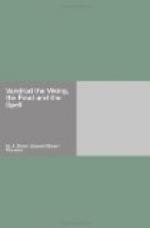“My father, I fear, is in a black mood,” she said. “His moods come and go, I know not why or when. To-day and perhaps to-morrow, and it may be for four days or more, he will sit in his cell or on the grass before the door, speaking never a word, and hardly answering when I talk to him. Pay no heed to him; he means no inhospitality.”
“I fear he likes me not,” said Estein. “He came here to escape men, you say, and now he has to entertain a stranger and a Viking.”
“It is not that,” she said. “The black moods come when we are alone; they come sometimes with the rising storm, sometimes when the sun shines brightest. I cannot tell when the gloom will fall, nor when he will be himself again. When his mind is well, he will talk to me for hours, and instruct me in many things.”
“Has he instructed you in this religion he professes? Know you what gods he worships?”
Osla opened her eyes in perplexed surprise; she hardly felt herself equal to the task of converting this pagan, and yet it were a pity not to try. So she told him, with a woman’s enthusiastic inaccuracy, of this new creed of love, then being so strikingly illustrated in troubled, warlike Christian Europe.
“And what of the gods I and my ancestors have worshipped for so long? What place have they in the Valhalla of the white Christ?”
“There are no other gods.”
“No Odin, no Thor, no Freya of the fair seasons, no Valhalla for the souls of the brave? Nay, Osla, leave me my gods, and I will leave you yours. Mine is the religion of my kinsmen, of my father, of my ancestors. And,” he continued, “would you say that Christian men are better than worshippers of Odin? Are they braver, are their swords keener, are they more faithful to their friends?”
“We want not keen swords. Warfare is your only thought. You live but to pillage and to fight. Have you known what it is to lose home and brothers all in one battle? Have you fled from a smoking roof-tree? Have you had mercy refused you? Have you had wife or child borne away to slavery? That is your creed—tell me, is it not?”
“I have thought of these things, Osla,” said Estein gravely. “I have thought of them at night when the stars shone and the wind sighed in the trees. When I look upon my home and see the reapers in the fields, and hear the maidens singing at their work, I would sometimes be willing to turn hermit like your father, and sit in the sun for ever.
“But,” he went on, and his voice rose to a clear, stirring note, “I could not rest long so. The sea calls us Northmen, and we cannot bide at home. Unrest seizes us like a giant and hurls us forth. We must be men; we must seek adventure on sea or on shore; there are foemen to be met, and we long to meet them; and if we bear us bravely, never striking sail though the wind blow high, and never flinching from the greatest odds, we know that the gods will smile, and, if they will, we die happy. We are not all bairn-slayers. I have been taught to spare where there was nothing worthy of my steel, and no maid or mother has yet suffered wrong at my hands. Yet must I sail the seas, Osla, and fight where I find a foe; for I feel that the gods bid me, and a man cannot struggle with his fate.”




